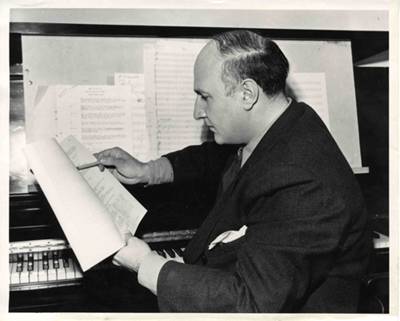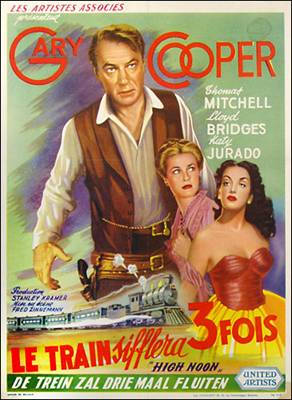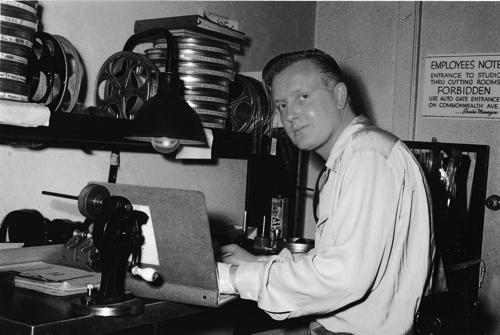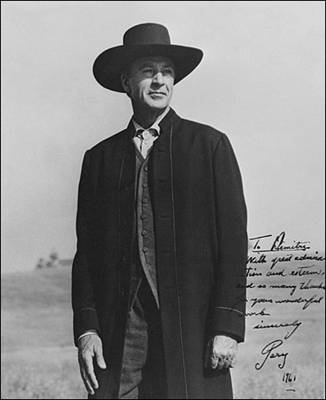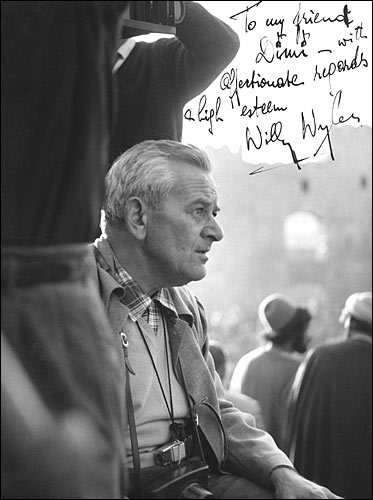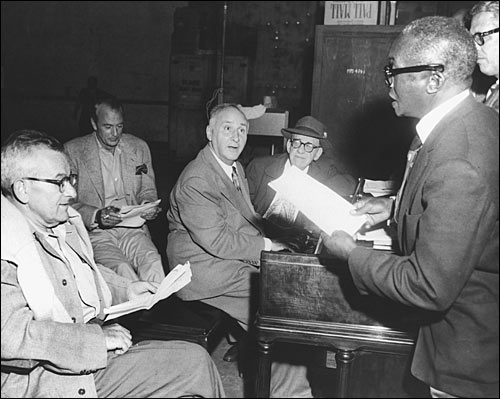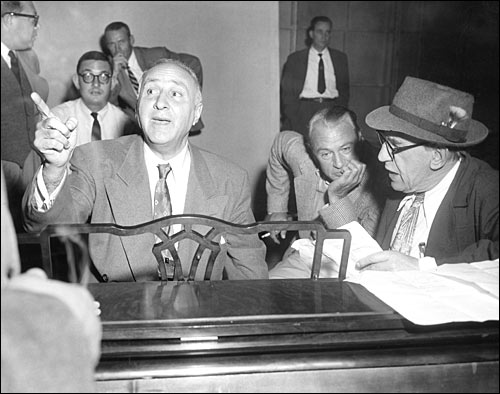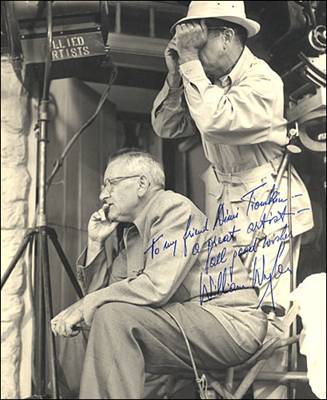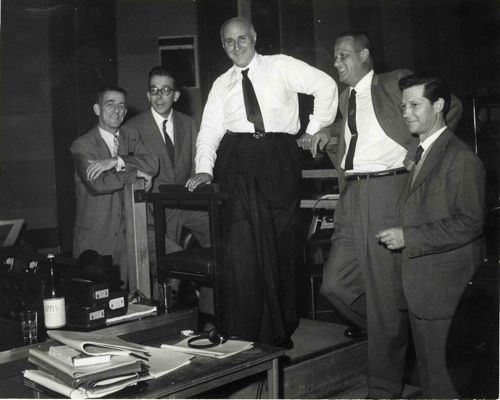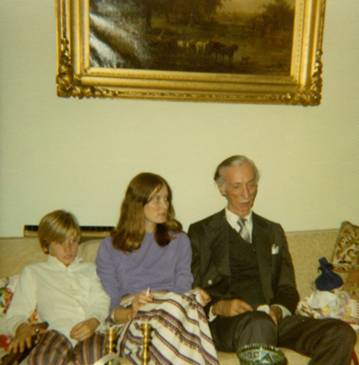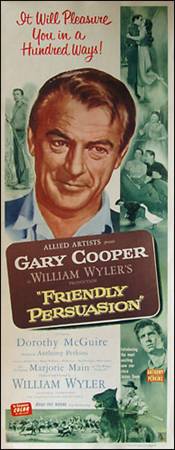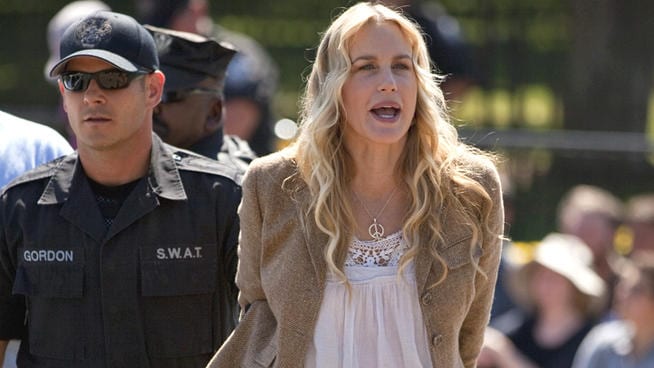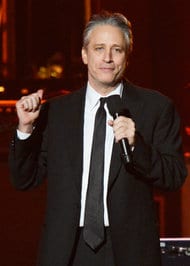Dimitri Tiomkin as I remember him
JUNE 1, 2013 · POSTED IN COMMENTARY
by Jack Wallace, boryanabooks
Dimitri Tiomkin at work, mid-1940s.
He was without a doubt the greatest tunesmith who helped invent the music of Hollywood during the sound era. Just as Aaron Copland defined the sound of the American West of myth and legend for ballet and the concert hall, so did Dimitri Tiomkin do the same thing for the movies. It was a half a century ago and still is today a maxim in Hollywood that more is usually better. For Dimitri, more was usually OK, but the most was even better. For many of his scores, nothing less than the biggest, the loudest, and the most colorful (richly orchestrated) would do. Case in point: in Alfred Hitchcock’s thriller, I Confess, there’s a scene where Montgomery Clift, playing a priest, is crossing the street on his way to church. For most other film composers, a solo instrument such as a piano would have been sufficient, even in those days. But not for Dimitri, for whom the full orchestra blasting away as though reaching the finale of a Mahler symphony was what was the scene compelled. Excessive? Maybe. But he was a first rate composer who happened to be working in the movies; and the interplay of the music with the action on screen turned the routine into the memorable.
French window card for High Noon.
Dimitri was also the first American film composer to use a chorus (Red River) to elevate action sequences into historical narrative and the first to use a balladeer (High Noon) so that the poignant use of the song “Do Not Forsake Me, Oh My Darlin’” turns the film itself into a ballad. As a matter of fact, I’ve been told by people who were there that test audiences responded poorly to High Noonbefore the music went in. But once the music enveloped the film, High Noon became the most highly regarded picture of 1952. The fact that it didn’t win the Best Picture Oscar® owes everything to the politics of McCarthyism of the time and nothing to the merits of the picture that did end up winning the Best Picture Oscar® that year, The Greatest Show on Earth, unquestionably the lousiest movie to ever have been so honored. But that hardly mattered inasmuch as Greatest Showwas directed by Cecil B. DeMille, who had burnished his patriotic bonafides by out-McCarthying McCarthy.
It was my pleasure to know Dimitri Tiomkin while we were both working on William Wyler’s film of Friendly Persuasion back in 1955. Dimitri had come to Hollywood in the 1930s; I started to work in the “biz” [shortened from show biz, an informal expression for those in the entertainment industry, particularly in Hollywood—Ed.] shortly after I got out of the Marines in 1946. One of my first projects was assisting my brother-in-law at the time, Franchot Tone, on the production of The Man on the Eiffel Tower, a picture which he also produced and which starred, along with Franchot, Burgess Meredith, Charles Laughton, and my older sister, Jean Wallace. I worked on that picture as a student script clerk and otherwise assisted by doing anything and everything anybody asked me to do.
Jack Wallace in the editing room at work on Friendly Persuasion at the Monogram lot in Hollywood. Allied Artists, the production company responsible for the film, rented space at Monogram.
For Friendly Persuasion I was initially assigned to director William Wyler for whom I performed a variety of functions. One of them was that of an assistant editor who would review all of the second unit material and organize it for sequential laying into the movie by the film’s main editor, Robert Swink, whom Wyler had also used on Roman Holiday a few years before.
Another thing Wyler had me do was assist the film’s most important star, Gary Cooper, keep him company, and generally act pleasant around him. One day Cooper and I went to lunch at the Brown Derby in Hollywood, which was on Vine Street just south of Hollywood Boulevard.
Gary Cooper
Lunch lasted about an hour and a half; and Coop had a lot on his mind that he wanted to share with me, except that none of it had to do with the picture. No, the one and only topic that was of any interest to Gary Cooper was women. I hardly knew the man; but that didn’t keep him from describing with specificity what he surmised the waitress, every woman we saw walking in or out of the restaurant, and every woman we could see at a table would look like without her clothes on. Each of the women of manageable age was graded not only as to her physical appearance, but also as to what Coop thought to be the woman’s love making skills. He had a one-track mind, and the purity of his focus kept me entertained from the moment I sat down at his table until we left the restaurant.
When the film was through shooting and had been edited so everyone was pretty much satisfied with the way it was going to look once the picture made it to the theaters, it was time to start working seriously on the music; and William Wyler—or Willy Wyler as he was called by his intimates—turned me over to the film’s composer, who took an instant like to me, as I did to him.
Director William Wyler
I remember that cold winter evening at Paramount Studios when I arrived with Dimitri so we could watch what we were told was the final cut before the scoring of the music. Also present at Paramount that night were Willy, first editor Swink, second editor Robert Belcher, and a few others who had something to do with the production of the picture but whose names I can’t recall at this time.
Wyler had made some movies that were memorable on account of their quality–Dodsworth,Wuthering Heights, and Carrie come to mind–and several that are memorable for being ponderous. In that category I would place Ben-Hur, The Best Years of Our Lives, andFriendly Persuasion, the latter which was probably the most ponderous of all in his oeuvre.Friendly Persuasion in the version we saw without the music was one helluva long and painful movie; and after it was over, Wyler turned to Tiomkin and told him that he would be letting Tiomkin know shortly where the music ought to go and what he expected to hear. Now in many cases, especially where the collaboration between the film’s director and his composer is one based on mutual respect, the “spotting of the picture,” i.e. defining those parts of the film best served by musical support, is a collaborative effort as between the composer and the director.
Dimitri Tiomkin (seated at piano), with (left to right) director William Wyler, actor Gary Cooper, actor Walter Catlett, and choral director Jester Hairston. Taken during the music rehearsal or recording session for Friendly Persuasion, circa 1955-1956.
Steven Spielberg and John Williams are said to typically work together in this fashion. There are also a few cases where the composer is thought of so highly that he not only decides unilaterally where the music is to go, but the director even collaborates with the composer with the editing to make sure the music will be best served by the picture (rather than the other way around, which is the way things are typically done). I’ve read that Prokofiev worked together in this manner with Sergei Eisenstein on Alexander Nevsky; and the result was a splendid score, the cantata derived from which has remained the most often performed composition for film in the concert hall repertoire.
It is the rare case where the director intimates to the composer, as Wyler did here, that the decisions respecting the placement of the music and the type of music called for, are decisions for the director. As soon as Wyler finished telling Tiomkin what the former expected–that he, Wyler, would be solely responsible for any and all decisions pertaining to the music–Tiomkin let loose with a series of invectives that surpassed anything I had ever heard in my life, even in my four years with the Marines during and just after World War II. Long story short, Dimitri was ready to kill just about everyone in the room with the possible exception of yours truly. “You’re gonna tell me where you want my music in your lousy, stinking, *%@)$^!#*%@!Q(Y%* picture! What do you take me for? I’ve been writing the music in my head for your crappy movie since you gave me that godawful script and the stupid novel on which it was based. You want to tell me where the picture needs music? I figured that out while I watched it, and you’re going to need a lot of it if this picture is ever going to work.” Because he had expected it, Wyler took it all in with a bemused look. As for Dimitri, he turned to me and, without missing a beat, said, “Come on, Boychik, let’s get the hell out of here.” And so we left.
Over the next several weeks, Dimitri wrote his usual splendid score. Its theme song, “Thee I Love,” with lyrics by Paul Francis Webster, was nominated for an Oscar® and later turned into hit singles by both Pat Boone and the Four Aces. I worked with Dimitri for the entire time that the film was being scored. Not being a composer or even musically trained, I couldn’t assist with the orchestration; but I was able to help him in at least a couple of ways.
Dimitri Tiomkin at the piano, with actors Gary Cooper (hand on chin) and Walter Catlett (far right), Friendly Persuasion, circa 1955-1956.
First of all, I was able to help him with the music editor, Richard Harris. You see, William Wyler was a director who could not stop touching his picture. Every day he had a new thought. Dimitri once said to Wyler, “Just give me the *#!@#*%#* picture, and stop changing it. When you change the picture, I have to change my music.” Willy would dismissively say to Dimitri, “Sure, sure; right,” and then go back and make even more changes. Two feet here; two more feet there. Instead of ending a scene with a close-up of a woman, he’d end up with a close-up of a man; or instead of ending with a close-up of a man, he’d end the scene with a close-up of a woman. He fiddled, and he fiddled; and I must say, he fiddled pretty well. It’s not really that unusual to fiddle. A certain amount of it goes on even after the “final cut” in every picture, even in the cheesy Tarzan movies of the time.
William Wyler
Unfortunately, fiddling always makes it more difficult for the composer. In the case of William Wyler’s movies and, I think, Friendly Persuasionin particular, it happened more than on most movies.
And so I acted as the liaison between Dimitri and the music editor, Richard Harris. If there was anything I could do to convince Harris, who was taking his orders from Wyler, to do something less drastic in the re-editing that would cause Dimitri to have to suffer through fewer re-writes, I would do that to the best my abilities.
Dimitri Tiomkin with music cutter Dick Harris (first on his left).
Sometimes I would, even at the risk of trying to help above my pay grade, talk to Harris about ways I thought the music could be shifted around so it wouldn’t have to be re-composed. The funny thing about it, of course, is that Dimitri could have done everything I did much better himself had he bothered to approach Harris directly. But he liked having me do it, just as he liked having me around.
I guess you might say that I was Dimitri Tiomkin’s go-to guy on Friendly Persuasion. He liked me–called me “Boychik” [a Yiddish word for a young man with more chutzpah than brains—Ed.] whenever he addressed me–because I was properly nebbish around him but at the same time could still say witty things. I guess he thought I was funny. A lot of people have told me that I have a good sense of humor, and I suppose it’s true. But I’ve never let my sense of humor interfere with diplomacy. It was, of course, one thing for me to sit patiently in Dimitri’s study while listening to him vent on the film’s director, some of its actors—Tony Perkins was all wrong in our opinion for the part of Gary Cooper’s son—and various others associated with the picture in one capacity or another; and it was also OK for me to nod my ahead and agree with him. But he also appreciated that I didn’t try to match him story for story, invective for invective. The reality is that I was making the best money in my life at the time, and my regard for those who were paying me was sufficient to prevent me from doing anything that might cause them to rethink our relationship.
From left to right: Cornel Crawford, Karol Crawford, and Eugene Zador.
In 1971 and 1972, Jack’s younger sister, Karol, would spend at least half an hour most Saturday nights empathizing with Los Angeles composer Eugene Zador in the privacy of his study as he would hold court on who, for better or for worse, was who in music. (For example, Schoenberg was a fraud.) Karol appreciated Dr. Zador’s “observations” no less than Jack enjoyed listening to what Dimitri Tiomkin told him in private two decades earlier about who in the “biz” was any good and who was simply a jerk. (According to Dimitri, there seemed to have been an endless supply of the latter.)
Mainly he liked me because I liked him, respected his talent, and knew something about fine music and the other arts. And also because I enjoyed listening to him grouse about others in the “biz” whom he considered, with good cause I should say, to be his intellectual and creative inferiors.
(As it happened, my younger sister, Karol, would listen patiently and respectfully to the grousings of another gifted Los Angeles composer approximately two decades later, albeit it under completely different circumstances and for one whose operas, concertos, and other orchestral pieces without doubt surpassed his music for film. The composer’s name was Eugene Zador; but that’s another story, and I digress.)
I remember Dimitri Tiomkin fondly for his wit, his honesty, his skills as a musician, and for his outgoing personality. Tiomkin, who conducted his own scores, enjoyed going overtime and maybe even an extra day because it gave him pleasure to see the musicians who were giving everything they had to his music make some extra money. I remember that while he was conducting the music for Friendly Persuasion on Stage Nine at Goldwyn Studios, he had this enormous Russian guy friend of his, or maybe it was just another assistant, come over to him with a towel, liquid, and a change of shirt; and then Dimitri, while standing in front of the whole orchestra instead of modestly retiring behind a screen, would strip down to waist, have the liquid applied to his upper body, towel off, put on a fresh shirt, and then go back to the business of conducting his terrific score.
U.S. insert (movie poster).
When Friendly Persuasion was complete, there were at least three different previews in three different towns. Dimitri, whose contract probably required him to attend, didn’t care to walk into the theaters where the film was being shown in the company of William Wyler. But he always made sure to ask me to be with him at the previews, and so, glad that it meant something to him, I couldn’t have been happier to spend those evenings with him.
I’ll turn 87 this coming Saturday. Friendly Persuasionhappened a long time ago. With the exception of Richard Eyer, who played the other son of Gary Cooper and Dorothy McGuire, everyone who had anything important to do with the film is no longer with us. But, mostly because of my friendship with Dimitri Tiomkin, I remember it all with clarity and delight.
Jack Wallace, as told to Les Zador
Thursday, April 24, 2013
Los Angeles, California
* * *
Jack Wallace with his sisters and nephew, circa 1968. From left to right: Cornel Crawford, Jean Wallace, Jack Wallace, and Karol Crawford.
Jack Wallace (b. 1926) worked in Hollywood as an assistant editor and publicist, among other things. His sister, Jean Wallace, was married to actor Franchot Tone during the 1940s and later to actor and director Cornel Wilde. She appeared with Wilde in several of his films, most notably his anti-war epic from 1967,Beach Red. Jack Wallace personal photographs courtesy Jack Wallace and Les Zador.
Thanks to Les Zador for making this article possible. Les has been friends with Jack and other Wallace family members for more than 40 years. In April, Les sat down with Jack to capture Jack’s memories of working with Tiomkin on Friendly Persuasion. Les serves on the board of the Film Music Foundation and is a practicing attorney in Encino, California.
Of this article, Olivia Tiomkin wrote, “It is a real gem and it’s wonderful to still have Jack around to tell his story.”
______________________________________________
This article by Jack Wallace may also be found on the Dimitri Tiomkin website together with a great deal of additional information about Mr. Tiomkin’s life and his career together with many additional photos and Tiomkin “news.” To that end, we encourage you to peruse the Tiomkin website for more information–www.dimitritiomkin.com–biographical and otherwise.
